Autumn Statement: Spending more on the elderly risks further alienating the young
Will it be a fairer country? Not for younger people


The inevitable headlines about which Whitehall departments were winners and losers from George Osborne’s spending review mask a significant reshaping of the state.
Health and old people will between them soak up 42.3 per cent of state spending by 2020 – up from 33.8 per cent in 1997. The share going on education and boosting the economy will fall over the same period.
Matthew Whittaker, chief economist at the Resolution Foundation which crunched the Autumn Statement numbers, said: “Britain’s shrinking state is also being radically transformed. By 2020, public service provision will be dominated by health. The shift has profound implications for what young people receive from the state.”
Indeed, there was little cheer for younger people in the package. While the basic state pension rises by 2.9 per cent, most working age benefits will remain frozen until 2020.
Although the schools budget is protected for inflation, in reality it will be “flat” because pupil numbers are rising. Pupil premium money for children from poor families will also remain flat. There will be a similar squeeze on sixth form and further education colleges. Maintenance grants for university students from low income families will be replaced by loans, adding to the debt burden they will carry from paying back their £9,000 tuition fees.
While the Chancellor trumpeted measures to boost housebuilding, his plans were heavily geared towards those who can afford to buy and there was not much for young adults stuck in “generation rent” on low incomes.
True, Mr Osborne could point to his pledge to create three million apprenticeships by 2020, and argued that by balancing the nation’s books, the Government would “leave to the next generation a stronger country than the one we inherited.”
But will it be a fairer country? Not for younger people. Public spending is being skewed towards the old. This is in part due to people living longer, which is bound to push up the health budget. But we are also making deliberate choices that could create enormous and dangerous tensions between the generations.
Old people were largely protected during the recession, while children and working age adults were the major losers. The median income of pensioners (£394 a week) is now higher than that of the rest of the population (£385 a week), according to the Institute for Fiscal Studies.
Officially, more than 1m pensioners fall within the current definition of living in poverty. But many of today’s pensioners have low housing costs having paid off their mortgages. One government adviser said: “The truth is that pensioner poverty has been virtually abolished but no politician dares to say it – not least because old people vote.”
The state pension and perks such as winter fuel allowances and free bus passes were off limits for Mr Osborne because of Conservative promises at the May general election. There is never a good time to cut them, as there is always another election coming. So the Chancellor entrenched the “triple lock” under which the state pension rises by 2.5 per cent, earnings or prices, whichever is higher. The cost is estimated at £6bn a year.
Although pensioners remain a powerful lobby group that politicians fear, different voices are thankfully starting to be heard. The charity Independent Age has bravely called for a debate about whether wealthiest pensioners should keep universal benefits like the fuel payments in an age of austerity.
As they retire, affluent baby boomers are not a selfish generation which wants to pull up the ladder behind them after doing very nicely out of the huge rise in property prices. They worry about the prospects of their children and grandchildren in education, jobs and housing.
Mr Osborne did nothing to avert what a growing number of politicians fear – a breakdown in the contract between the generations, which sees the young deeply resent paying through their taxes for the benefits and health care of the old.
Politically, the Chancellor’s strategy might work for his party while older people turn out to vote in much greater numbers than young adults. But if Labour could get its act together, and promise with credibility to tackle the inequility in the way the public spending cake is cut, the Tories’ generation game might one day have a different electoral result.
Join our commenting forum
Join thought-provoking conversations, follow other Independent readers and see their replies
Comments
Bookmark popover
Removed from bookmarks